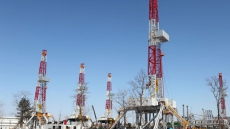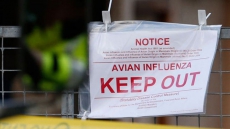EDMONTON — Alberta's environment minister says the province plans to use the upcoming climate change conference in Peru to discuss a uniform price for carbon across Canada and the rest of the continent.
"We would like to work with the rest of Canada — and by extension the rest of North America — on trying to establish the consistent, fair price on carbon," Kyle Fawcett told The Canadian Press in an interview before he headed to Lima for the UN-sponsored conference.
"I know that's not going to be an easy thing, but it's something we want to be leaders in, and that will take engaging some of the other jurisdictions in this country to begin with."
Fawcett said any agreement would have to be applied equally across borders and across economies, despite the inevitable attempts to include exemptions and special breaks for favoured industries.
Fawcett acknowledged that would put pressure on Alberta's current carbon tax, which applies only to major emitters and only on greenhouse gas emissions above a government-mandated level. Most carbon tax models, such as British Columbia's, apply much more broadly.
As well, Alberta's $15-dollar-a-tonne price is considered too low to achieve actual reductions in emissions. Fawcett said the government understands that to get a consistent price across jurisdictions, it may have to be higher.
"We're well aware of that and that's part of ongoing discussions," he said.
"There hasn't been any decisions (about a higher price). I'm not willing to comment on whether there will be increased costs or no increased costs until we've made those final decisions."
Some of those decisions will be reflected in the province's new environment strategy, which Fawcett said should be released before the end of the year. He hinted it will go beyond industry.
"Each and every individual has a role to play in emissions management and I think that's going to be very clear as we roll out our emissions plans."
Industry has been involved in developing those plans, he said.
Although Fawcett suggested Alberta has "a good story to tell" on the environment, the province is often painted as a ecological villain. Its greenhouse gas emissions continue to rise, new information is being released on toxins released by the oilsands and concerns keep growing about the energy industry's impact on the environment.
He acknowledged Alberta has a ways to go in convincing a skeptical world at conferences such as the one in Lima that the province is serious about improving its environmental record.
"We know that we haven't necessarily been on track there. That means we have to redouble our efforts and think smarter about what it's going to take to get there.
"We know that when we make commitments to the world, that there's a trust factor there, and when you make those commitments you're expected to meet those."
Fawcett said it's still possible for Alberta to do its share to meet announced federal targets that would bring greenhouse gas emissions 17 per cent below 2005 levels by 2020.
"It's not going to be an easy task, but it is a possible one. There's a lot of discussion that needs to happen on how to make that work.
"We're past the point where there's any debate around the science of climate change."






